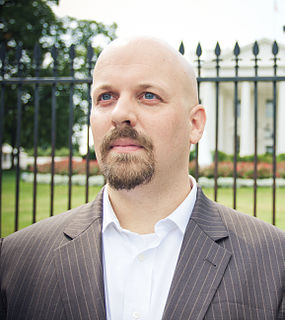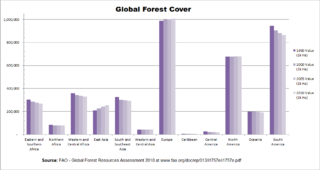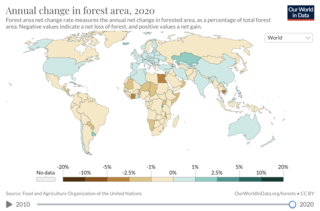
Deforestation or forest clearance is the removal of a forest or stand of trees from land that is then converted to non-forest use. Deforestation can involve conversion of forest land to farms, ranches, or urban use. The most concentrated deforestation occurs in tropical rainforests. About 31% of Earth's land surface is covered by forests at present. This is one-third less than the forest cover before the expansion of agriculture, a half of that loss occurring in the last century. Between 15 million to 18 million hectares of forest, an area the size of Bangladesh, are destroyed every year. On average 2,400 trees are cut down each minute.

Greenpeace is an independent global campaigning network. The network comprises 26 independent national/regional organisations in over 55 countries across Europe, the Americas, Africa, Asia and the Pacific, as well as a co-ordinating body, Greenpeace International, based in Amsterdam, the Netherlands. Greenpeace was founded in Canada in 1971 by Irving and Dorothy Stowe, immigrant environmental activists from the United States. Greenpeace states its goal is to "ensure the ability of the Earth to nurture life in all its diversity" and focuses its campaigning on worldwide issues such as climate change, deforestation, overfishing, commercial whaling, genetic engineering, and anti-nuclear issues. It uses direct action, lobbying, research, and ecotage to achieve its goals. The global network does not accept funding from governments, corporations, or political parties, relying on three million individual supporters and foundation grants. Greenpeace has a general consultative status with the United Nations Economic and Social Council and is a founding member of the INGO Accountability Charter, an international non-governmental organization that intends to foster accountability and transparency of non-governmental organizations.

Reforestation is the natural or intentional restocking of existing forests and woodlands (forestation) that have been depleted, usually through deforestation, but also after clearcutting.

Illegal logging is the harvest, transportation, purchase or sale of timber in violation of laws. The harvesting procedure itself may be illegal, including using corrupt means to gain access to forests; extraction without permission, or from a protected area; the cutting down of protected species; or the extraction of timber in excess of agreed limits. Illegal logging is a driving force for a number of environmental issues such as deforestation, soil erosion and biodiversity loss which can drive larger scale environmental crisis such as climate change and other forms of environmental degradation.
Sinar Mas is one of the largest conglomerates in Indonesia. It was formed in 1938. It has numerous subsidiaries including Asia Pulp & Paper and palm oil producer PT SMART. The company also acquired Berau Coal Energy from Asia Resource Minerals PLC, a major mining group founded by Nathaniel Philip Rothschild, in a takeover initiated by Fuganto Widjaja.

The Congo Basin is the sedimentary basin of the Congo River. The Congo Basin is located in Central Africa, in a region known as west equatorial Africa. The Congo Basin region is sometimes known simply as the Congo. It contains some of the largest tropical rainforests in the world and is an important source of water used in agriculture and energy generation.
Size of Wales is a climate change charity with the aim of conserving an area of tropical rainforest twice the size of Wales. The project currently supports 7 forest protection projects and 1 tree planting project across Africa and South America. The charity focuses upon furthering the promotion of rainforest conservation as a national response to the global issue of climate change.

Asia Pulp & Paper (APP) is an Indonesian pulp and paper company based in Jakarta, Indonesia. One of the largest pulp and paper companies in the world, it was founded as Tjiwi Kimia by Eka Tjipta Widjaja in 1972. Asia Pulp & Paper is a subsidiary of Sinar Mas Group and was officially formed in 1994 when Sinar combined its paper and pulp operations from Tjiwi Kimia and PT Inda Kiat Pulp & Paper.
John Sauven, is a trained economist, environmentalist and executive director of Greenpeace UK since 2008. Before that he was the director responsible for Greenpeace communications and specialised on solutions and working with business. Sauven started working in a temporary position for Greenpeace in 1991 while waiting for a place at teacher training college. As director, Sauven has helped to shape Greenpeace UK's commitment to defend the natural world and promote peace by investigating, exposing and confronting environmental abuse, and championing environmentally responsible solutions.

Brazil once had the highest deforestation rate in the world and in 2005 still had the largest area of forest removed annually. Since 1970, over 700,000 square kilometres (270,000 sq mi) of the Amazon rainforest have been destroyed. In 2001, the Amazon was approximately 5,400,000 square kilometres (2,100,000 sq mi), which is only 87% of the Amazon's original size.

The Amazon rainforest is the largest rainforest in the world, covering an area of 6,000,000 km2. It represents over half of the planet's rainforests and comprises the largest and most biodiverse tract of tropical rainforest in the world. This region includes territory belonging to nine nations. The majority of the forest is contained within Brazil, with 60%, followed by Peru with 13%, Colombia with 10%, and with minor amounts in Venezuela, Ecuador, Bolivia, Guyana, Suriname and French Guiana.

The Prince's Rainforests Project (PRP) was set up in the UK in 2007 by Charles, Prince of Wales following reports from leading climate change experts, including the Intergovernmental Panel on Climate Change, to promote awareness of the urgent need to take action against tropical deforestation. The Prince of Wales has long been concerned about climate change and about how destruction of the world's rainforests contributes to rising temperatures and sea levels.

Philip David Radford is an American activist who served as the executive director of Greenpeace USA. He is the founder and President of Progressive Power Lab, an organization that incubates companies and non-profits that build capacity for progressive organizations, including the Progressive Multiplier Fund and Membership Drive. Radford is a co-founder of the Democracy Initiative, was founder and executive director of Power Shift, and is a board member of the Mertz Gilmore Foundation. He has a background in grassroots organizing, corporate social responsibility, climate change, and clean energy.

Rates and causes of deforestation vary from region to region around the world. In 2009, 2/3 of the world's forests were located in just 10 countries: 1) Russia, 2) Brazil, 3) Canada, 4) The United States, 5) China, 6) Australia, 7) The Democratic Republic of the Congo, 8) Indonesia, 9) India, and 10) Peru.
Palm oil, produced from the oil palm, is a basic source of income for many farmers in South East Asia, Central and West Africa, and Central America. It is locally used as cooking oil, exported for use in much commercial food and personal care products and is converted into biofuel. It produces up to 10 times more oil per unit area than soybeans, rapeseed or sunflowers.

Deforestation in Indonesia involves the long-term loss of forests and foliage across much of the country; it has had massive environmental and social impacts. Indonesia is home to some of the most biologically diverse forests in the world and ranks third in number of species behind Brazil and the Democratic Republic of Congo.

Deforestation in Borneo has taken place on an industrial scale since the 1960s. Borneo, the third largest island in the world, divided between Indonesia, Malaysia and Brunei, was once covered by dense tropical and subtropical rainforests.

Avoided Deforestation Partners, or AD Partners, is a non-profit organization under the auspices of the Center for International Policy in Washington, D.C. AD Partners is involved in the global effort to solve climate change by working to end deforestation in tropical rainforest countries. By avoiding the practice of deforestation, i.e., clearing forests to provide inexpensive farmland, the world gains the significant climate benefits of not releasing carbon into the atmosphere. In addition, avoiding deforestation also allows forests to sequester carbon and scrub the air of pollutants. Beyond protecting our air quality, tropical forests create the conditions for rain, recharge our water sources, provide habitats for myriad plant and animal species, and support a way of life for 1.6 billion forest dependent people. Leading scientists and economists say that ending deforestation is the most cost effective and scalable method of reducing greenhouse gases. In fact, they believe that ending deforestation will cut the timeframe for solving the climate crisis in half.

Deforestation is a primary contributor to climate change. Land use changes, especially in the form of deforestation, are the second largest anthropogenic source of atmospheric carbon dioxide emissions, after fossil fuel combustion. Greenhouse gases are emitted during combustion of forest biomass and decomposition of remaining plant material and soil carbon. Global models and national greenhouse gas inventories give similar results for deforestation emissions. As of 2019, deforestation is responsible for about 11% of global greenhouse gas emissions. Carbon emissions from tropical deforestation are accelerating. Peatland degradation also emits GHG. Growing forests are a carbon sink with additional potential to mitigate the effects of climate change. Some of the effects of climate change, such as more wildfires, may increase deforestation. Deforestation comes in many forms: wildfire, agricultural clearcutting, livestock ranching, and logging for timber, among others. The vast majority of agricultural activity resulting in deforestation is subsidized by government tax revenue. Forests cover 31% of the land area on Earth and annually 75,700 square kilometers of the forest is lost. According to the World Resources Institute, there was a 12% increase in the loss of primary tropical forests from 2019 to 2020. Mass deforestation continues to threaten tropical forests, their biodiversity, and the ecosystem services they provide. The main area of concern of deforestation is in tropical rain forests since they are home to the majority of the planet's biodiversity.














